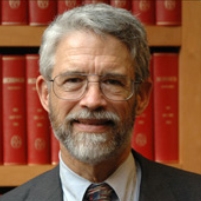Director of the Office of Science and Technology: Who is John Holdren?
Friday, October 29, 2010

When President Barack Obama nominated John P. Holdren to be director of the Office of Science and Technology Policy (OSTP), conservatives launched a major attack against him, claiming that Holdren had once advocated forced abortions. The source of this accusation was a chapter in a 1977 book he co-authored with Paul and Anne Ehrlich. In fact, although the subject of forced abortions is discussed in the text, Holdren never advocated them. They then claimed that he was a climate change alarmist. In the end, Holdren was unanimously confirmed by the Senate on March 20, 2009. He also serves as the Assistant to the President for Science and Technology and co-chair of the President’s Council of Advisors on Science and Technology (PCAST).
Holdren has said, “We are in the situation of driving an automobile with bad brakes toward a cliff . . . in the fog. The auto is the world’s energy-economic system and the cliff is climate-change catastrophe. We don’t know exactly where the cliff is because of the uncertainties in climate science—the fog—but that is hardly a consolation, or a reason not to try to slow down.”
Holdren was born March 1, 1994, in Sewickley, Pennsylvania, and grew up in San Mateo, California. He earned his bachelor’s degree in aerospace engineering from MIT in 1965, an MIT master’s degree in 1966, and his PhD in theoretical plasma physics from Stanford in 1970.
While still a student, Holdren worked as an aerospace engineer at the Lockheed Missiles and Space Company. He then joined the Lawrence Livermore National Laboratory as a theoretical physicist in the fusion energy program, and, briefly, he was a Senior Research Fellow in the Environmental Quality Laboratory and the Division of Humanities and Social Sciences at Caltech.
In 1973 he co-founded, and then co-directed until 1996, an interdisciplinary graduate program at the University of California, Berkeley (the Energy and Resources Group) that focuses on the interaction of scientific, technological, economic, and sociopolitical dimensions of energy and environmental challenges.
Holdren then moved to Harvard’s Kennedy School of Government to become the Teresa and John Heinz Professor of Environmental Policy and director of the Program on Science, Technology, and Public Policy. He served concurrently as Professor of Environmental Science and Policy in Harvard’s Department of Earth and Planetary Sciences and, beginning in 1996, as president and director of the independent, nonprofit Woods Hole Research Center.
Holdren has served since the early 1970s on a wide variety of advisory panels to government on science and technology matters, including the Committee on International Security and Arms Control of the National Academy of Sciences, which he chaired from 1994 to 2004. Through both terms of the Clinton administration, he served as a member of PCAST, working closely with OSTP and chairing studies requested by President Bill Clinton and Vice President Al Gore on preventing theft of nuclear materials, the prospects for fusion energy, an R&D strategy for the energy challenges of the 21st century, and international cooperation on energy technology innovation.
From 1987 to 1997 he served as chair of the Executive Committee of the Pugwash Conferences on Science and World Affairs, and in that capacity gave the acceptance speech for the Nobel Peace Prize awarded to the Pugwash Conferences in 1995. Holdren was also a recipient, in 1981, of one of the inaugural MacArthur Foundation Prize Fellowships. He subsequently served, from 1991 to 2005, as a member of the MacArthur Foundation’s board of trustees.
From its founding in 2002 until he joined the Obama administration, Holdren was co-chair of the National Commission on Energy Policy, a project of the Bipartisan Policy Center. In this position he helped create some of the provisions that were included in the 2005 Clean Energy Act, including those that offered financial incentives to produce “clean coal” and changes in the tax code to reward private sector energy research and development.
From 2005 to 2008, he served as president and chairman of the board of the American Association for the Advancement of Science. He was also a member of the Council of Advisors of the Civilian Research and Development Foundation (2001-2009); a member of the Board of Councilors of the China-U.S. Center for Sustainable Development (2002-2009); a member of the Board of Advisors of the Princeton Carbon Mitigation Initiative (2004-2007); and a member of the Board of Directors of Climate Central (2008-2009).
Holdren has co-written several books: Global Ecology: Readings Towards a Rational Strategy for Man (1971), Energy: A Crisis in Power (1972), .Population: Perspective 1973 (1973), Ecoscience: Population, Resources, and Environment (1977), Turning Numbers into Knowledge: Mastering the Art of Problem Solving (2008)
Holdren and his biologist wife, Cheryl, married in 1966 and have two children and five grandchildren.
-Noel Brinkerhoff, David Wallechinsky
John Holden Bio (Wikipedia)
Glenn Beck Claims Science Czar John Holdren Proposed Forced Abortions and Putting Sterilants in the Drinking Water to Control Population (by Robert Farley, PolitiFact, St. Petersburg Times)
Flawed Science Advice for Obama? (by John Tierney, New York Times)
Spotlight : John Holdren (Belfer Center Newsletter)
List of Books by John P. Holdren (Amazon.com)
- Top Stories
- Unusual News
- Where is the Money Going?
- Controversies
- U.S. and the World
- Appointments and Resignations
- Latest News
- Musk and Trump Fire Members of Congress
- Trump Calls for Violent Street Demonstrations Against Himself
- Trump Changes Name of Republican Party
- The 2024 Election By the Numbers
- Bashar al-Assad—The Fall of a Rabid AntiSemite






Comments